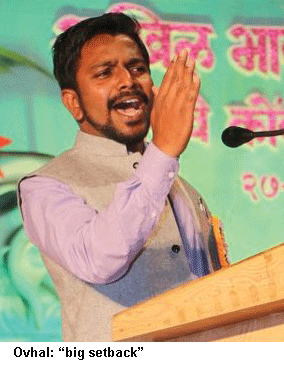 It’s an unwritten rule of indian politics that in the final year before general and state elections, leaders of all political parties experience an acute need to do justice to the country’s scheduled castes, tribes and other backward castes and classes. With the legislative assembly election scheduled to be called within the next 14 months in Maharashtra, on June 22, the BJP/Shiv Sena government felt obliged to impose a ten-day moratorium on first-year degree college admissions across the state to clear the decks to re-introduce reservations for SC, ST and OBC students in minority-run arts, science and commerce colleges.
It’s an unwritten rule of indian politics that in the final year before general and state elections, leaders of all political parties experience an acute need to do justice to the country’s scheduled castes, tribes and other backward castes and classes. With the legislative assembly election scheduled to be called within the next 14 months in Maharashtra, on June 22, the BJP/Shiv Sena government felt obliged to impose a ten-day moratorium on first-year degree college admissions across the state to clear the decks to re-introduce reservations for SC, ST and OBC students in minority-run arts, science and commerce colleges.
On October 12 last year, the Bombay high court struck down a 16-year-old Mumbai University (MU) order which obliged private colleges promoted by religious and linguistic minorities, to reserve seats for SC, ST and OBC students. The moratorium on admissions announcement was made after the college admission process had begun, and has derailed the academic calendars of 2,800 minority colleges in the state besides adversely affecting 1.5 million students who have begun the process of applying for first-year college admissions.
Minority colleges are permitted to reserve upto 50 percent seats for students drawn from the promoters’ religious or linguistic community. Until October 2017, the break-up of 100 admission seats in minority colleges typically entailed setting aside 15 seats for the management quota. Of the remaining 85 seats, 43 were reserved for students from the religious/linguistic communities of the promoters of the institute, leaving 21 seats for general merit students and 21 for OBC, ST and SC category students.
However, the October 12 Bombay high court ruling, which became operational in the new 2018-19 academic year exempted minority institutions from reservations other than for management, merit students of the promoters’ religious/linguistic community. Adjudicating a writ petition filed by St. Xavier’s College, Mumbai and the Maharashtra Association of Minority Educational Institutions which challenged the constitutional validity of a circular dated May 30, 2001 of Mumbai University, a two-judge high court bench held that “the quota within quota” mandated by the state government is “unconstitutional”.
“Almost 3,000 of the 4,000 undergrad colleges in the state are minority-run institutions and if they are allowed to de-reserve the few seats they have been allotting to students from the backward classes, it will be a big setback for social justice,” says Aniket Ovhal, a member of the Akhil Bharatiya Vidyarthi Parishad (ABVP), the student wing of the Rashtriya Swayamsevak Sangh (RSS), BJP’s ideological mentor.
Surprisingly, neither the student unions nor the Maharashtra government realised the impact of the Bombay high court’s judgement until the media highlighted the exclusion of SC, ST and OBC students when minority colleges released their first merit list on June 18. Addressing the media, the state’s education minister Vinod Tawde said the government has readied a special leave petition (SLP) against the Bombay high court order to be filed in the Supreme Court. “We will wait for the outcome of our SLP. Until then the admission process for first-year degree courses has been stayed,” says Tawde.
For minority colleges, the state government’s belated resolve to challenge the high court’s ruling eight months after it was delivered, has caused major inconvenience. Instead of announcing their second list on June 22, they were obliged to stop their on-going admissions process. However, the admission process is expected to be further delayed as the government has filed its SLP in the apex court on June 29.
Minority college principals express shock and dismay about the government’s ad-hoc style of functioning. “The government is clearly reacting to media reportage highlighting that minority institutions are exempt from admitting backward class students and the agitation of student unions is backed by the state’s political parties. If some of them are making provision for backward classes, they are doing so voluntarily without legal obligation. Why didn’t the state government react to the high court judgement in 2017 itself? Meanwhile, there’s no clarity whether the admission process will have to be redone,” laments a principal of a Mumbai-based minority institute speaking to EducationWorld on condition of anonymity.
Although it’s well settled law that religious and linguistic minority colleges and universities are not obliged to reserve quotas for other than for their own, quite clearly the belated concern for enabling access of SC, ST and OBC students into highly prized minority institutions is driven by electoral than legal or social justice considerations. Although the state government’s SLP is certain to be struck down, the inconvenience caused to colleges and students is a small price compared to the electoral dividend that the BJP will reap in Maharashtra.
Dipta Joshi (Mumbai)